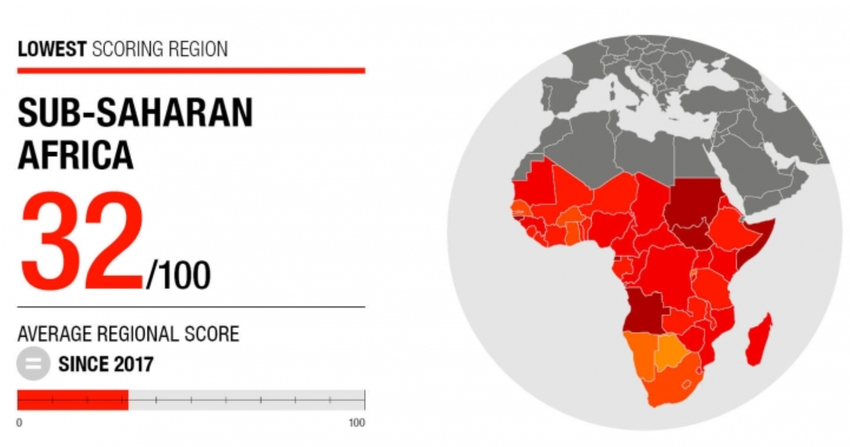By Petrus Marais*
Large-scale corruption is the elephant in the room in the ongoing conversation about Africa’s growth story. If countries on the African continent want to successfully attract the investment required for inclusive growth, governments and private sector players must take urgent action to tackle corruption.
This is not to say that graft is not a serious problem elsewhere in the world, but lessons from the fastest-growing economies in the world show that the fight against corruption must be prioritized if investors are to have confidence that their money will be safe in a particular country.
Too much talk and too little action on corruption is one of the biggest barriers to investment on the African continent. Despite commitments from African leaders in declaring 2018 as the African Year of Anti-Corruption, this year’s Corruption Perceptions Index (CPI) published by Transparency International presents a largely gloomy picture.
Only eight of the 49 participating countries scored more than 43 out of 100 on the index. In short, corrupt activities continue to stifle economic growth and good governance across the continent.
While advanced digital technology is now available to forensic investigators to help them uncover and prosecute corruption across Africa, the fight is being hampered by a lack of supporting legal frameworks, a lack of law-enforcement capacity and skills and, in some cases, increasing administrative hurdles imposed by data-protection laws.

However, there are a number of ways African governments can use forensic technology to root out fraudulent activity, improve governance and bring those guilty of corruption to book.
Empowering law enforcement in the data-protection era
Data protection and privacy regulations are vitally important for safeguarding people’s personal information. But the obligation of law enforcement agencies to enforce data protection rules is often at loggerheads with the needs of forensic investigators.
Such regulations increase the level of permission needed to access detailed financial information by external parties, including investigators. In South Africa, for example, in efforts to track misappropriated funds, a forensic investigator must first contact the forensic department of a bank, then register a criminal case with a constable on duty at a local police station.
If the matter is escalated, the investigator will likely have to contact the commercial crime division of the police service, followed by an application for a Section 204 subpoena in terms of the Criminal Procedure Act that, if successful, must be served on the relevant official at the bank before being able to access the first transactional leg of the information about suspicious transactions. This process can take six to eight weeks, by which time the money may have been shifted to another bank account, and a new subpoena is required.
A dedicated digital evidence office, with officials trained in understanding the complexities of digital evidence-gathering, would be a valuable tool in helping to fast-track forensic investigations and help investigators trace the web of corrupt officials linked to fraudulent activity. This would recognize that in specific and controlled circumstances, a process of legally facilitated access to information is necessary to secure evidence and improve the possibility of timely investigation and prosecution of corruption cases.
Improving the transparency of state tenders
While tender processes are designed to create competition among service providers, to prevent corruption, and to ensure governments get the best value for money, these public procurement systems also represent an opportunity for fraudsters and corrupt officials to access state funds under the guise of legitimacy.
Across Africa, a lack of transparency in tender processes has driven up corruption, not only discouraging much-needed investment, but creating unequal, pot-holed playing fields that prevent local small businesses from growing.
Online systems that automate the tender process of large government and state-owned entities have already been implemented in some countries and provide a way to not only generate useful data about the entities behind the bids, but provide a way to interrogate this information further if necessary.
Sophisticated fraudsters can submit multiple tenders, under different company names, without raising red flags. However, technology can improve governance by providing a mechanism to highlight suspicious entities that may be committing tender fraud across multiple departments and also to build in a functionality to drill into publicly held data to identify the ultimate beneficial owners behind a given bidder.
Anti-money laundering technology, too, can help by separating the person adjudicating the tender from the tender process, reducing the risk of corruption.
The regulation and costs of digital forensic investigations
The identification and analysis of digital evidence must be carefully considered and frameworks developed to ensure critical evidence is retrieved through carefully controlled processes to support potential litigation in a legally defensible manner.
Forensic technologies are not prohibitively expensive per se. However, in many African countries a lack of basic legal frameworks, technological skills and fragmented or basic information technology at state level impedes the efficiency of investigations, requiring investigation teams to invest more in time and personnel, driving up costs.
The cost of access to information remains high, with local government departments difficult to access and paper-based information the norm in many countries. Investment in cross-departmental information technology and systems can help to bring down costs and improve transparency.
Business, government and civil society must recognize the important role that access to information and evidence plays in preventing corruption and crime.By collaborating, both the public and private sectors could work together to set up the necessary infrastructure/database to provide a single repository or access portal for information that would provide confidence to potential investors as well as governments, ultimately showing that transparency and better governance are possible.
A streamlined system would provide all participants in an economy with legitimate access to data – not only to directly prevent fraud and corruption, but give wide enough access to the relevant information to allow everyone to collectively manage the corruption risk and grow businesses sustainably.
*Senior managing director, FTI Consulting South Africa
** First published in weforum.org




 By: N. Peter Kramer
By: N. Peter Kramer
